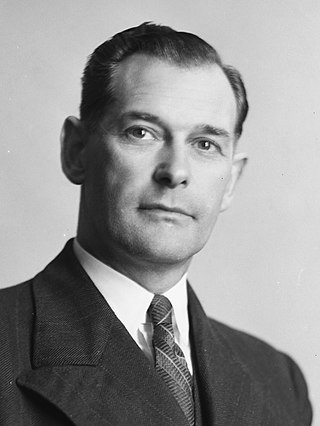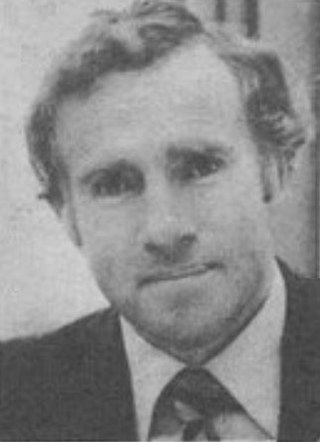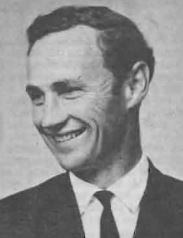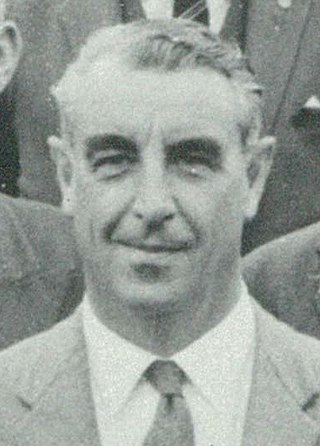| ||||||||||||||||
| Turnout | 14,730 (78.31%) | |||||||||||||||
|---|---|---|---|---|---|---|---|---|---|---|---|---|---|---|---|---|
| ||||||||||||||||
| ||||||||||||||||
The Marlborough by-election of 1970 was a by-election for the electorate of Marlborough, held on 21 February 1970 [1] [2] during the 30th New Zealand Parliament.
| ||||||||||||||||
| Turnout | 14,730 (78.31%) | |||||||||||||||
|---|---|---|---|---|---|---|---|---|---|---|---|---|---|---|---|---|
| ||||||||||||||||
| ||||||||||||||||
The Marlborough by-election of 1970 was a by-election for the electorate of Marlborough, held on 21 February 1970 [1] [2] during the 30th New Zealand Parliament.
The by-election resulted from the death of Tom Shand on 11 December 1969, only 12 days after he (and the government) had been re-elected on 29 November; and the new National candidate was defeated by the greatest swing against a government since the 1935 general election, in what was a largely rural electorate generally regarded a safe National seat. Tom Shand had held the seat from 1946, when he defeated Labour’s Ted Meachen.
The Labour Party selected Ian Brooks as their candidate. In 1969 he had stood in the electorate. [3]
There were five nominees who came forward for the National Party candidacy: [4] [5]
Shand was chosen to contest the seat at the party selection committee meeting. [6]
There were two candidates for the Social Credit Party nomination: [7]
Kerr was selected. It was the seventh consecutive time he had contested the seat, having done so at every previous election since 1954. [8]
The vote for Tom Shand had been close in 1966. Labour only decided that the seat was winnable in January, and sent in two MPs Arthur Faulkner and Colin Moyle to organise the campaign. Labour's candidate, Brooks, was local; he was a senior clerk in the Picton manual telephone exchange and also had a small farm. The seat was largely rural, but Brooks polled particularly well in Picton, and well in the other two population centres, Blenheim and Kaikōura. At the end of the campaign there was some criticism of Andy Shand for frequent "butting-in" during a combined television broadcast appearance for all the candidates on Wednesday 17 February. [9]
The following table gives the election results:
| Party | Candidate | Votes | % | ±% | |
|---|---|---|---|---|---|
| Labour | Ian Brooks | 7,060 | 47.93 | +9.29 | |
| National | Andy Shand | 6,017 | 40.85 | ||
| Social Credit | George Kerr | 1,171 | 7.95 | −0.29 | |
| Country Party | Clifford Stanley Emeny | 482 | 3.27 | ||
| Majority | 1,043 | 7.08 | |||
| Turnout | 14,730 | 78.31 | −13.33 | ||
| Registered electors | 18,809 | ||||
The election-night margin to Labour of 1131 was so great that the final result was not expected to change when special votes, which generally tended to go to National, were counted. [11] There were 32 informal votes. [12]
George Chapman was the Wellington National Party chairman. He heard reports that all was not well in the campaign, the party was in deep trouble, and that Labour was making an all-out effort. But he found that party president Ned Holt was complacent about the by-election; saying that everything was in order, and that in any case National's majority in Marlborough was big enough to absorb any setback. But on by-election night Labour inflicted a stunning defeat on National, reducing the Government majority from six to four, and shaking party confidence. Chapman became the leader for change in the organisation, resulting in his nomination for party president in 1971, although he did not become president until 1973. [13]
Despite winning a surprise victory in 1969, National was so embarrassed from the by-election defeat it triggered the media to seriously speculate about Prime Minister Keith Holyoake's retirement. [14]

The 1972 New Zealand general election was held on 25 November to elect MPs to the 37th session of the New Zealand Parliament. The Labour Party, led by Norman Kirk, defeated the governing National Party.

The 1969 New Zealand general election was a nationwide vote to determine the shape of Parliament's 36th term. It saw the Second National Government headed by Prime Minister Keith Holyoake of the National Party win a fourth consecutive term. This is the most recent election where an incumbent government won a fourth term in office.

The 1963 New Zealand general election was a nationwide vote to determine the shape of New Zealand Parliament's 34th term. The results were almost identical to those of the previous election, and the governing National Party remained in office.

Sir Gerard Aloysius Wall was a surgeon and a politician in New Zealand. He was Speaker of the New Zealand House of Representatives from 1985 to 1987. He was a member of the Labour Party.

Kaikōura is a New Zealand parliamentary electorate, returning a single MP to the New Zealand House of Representatives. The current MP for Kaikōura is Stuart Smith of the National Party, who won the 2014 election.

Kenneth Mark Comber was a New Zealand politician of the National Party, and an accountant.

Arthur Penrose Seymour was a 19th-century New Zealand politician from Picton. He was the 4th Superintendent of the Marlborough Province and was a member of the provincial government for all 16 years of its existence. With his strong advocacy for Picton, he successfully had the Seat of Government moved to Picton. When the Blenheim party secured a majority in the Provincial Council by 1865, Seymour negotiated the removal of the Seat of Government back to Blenheim.
Clutha was a New Zealand parliamentary electorate from 1866 to 1996.

Thomas Philip Shand was a New Zealand politician of the National Party.
Tasman is a former New Zealand parliamentary electorate, from 1972 to 1996.

Ian James Brooks was a New Zealand politician of the Labour Party.
Marlborough is a former New Zealand parliamentary electorate, in the Marlborough region at the top of the South Island. It existed from 1938 to 1996, and was represented by five Members of Parliament.
Wairau was a parliamentary electorate in the Marlborough Region of New Zealand. It was one of the initial 24 New Zealand electorates and existed from 1853 until its abolition in 1938, when it was succeeded by the Marlborough electorate. The electorate had 13 representatives during its existence. The 1861 election in the Wairau electorate was notable in that a later Premier, Frederick Weld, was unexpectedly and narrowly defeated by William Henry Eyes.
The Pahiatua by-election of 1977 was a by-election for the electorate of Pahiatua on 30 April 1977 during the 38th New Zealand Parliament.

The Hutt by-election of 1968 was a by-election for the electorate of Hutt on 3 August 1968 during the 35th New Zealand Parliament.
The Hurunui by-election 1961 was a by-election held in the Hurunui electorate in North Canterbury during the term of the 33rd New Zealand Parliament, on 10 June 1961.

The Bay of Plenty by-election 1957 was a by-election held in the Bay of Plenty electorate in the Bay of Plenty during the term of the 31st New Zealand Parliament on 6 April 1957.

The Wairau by-election 1872 was a by-election held in the Wairau electorate during the 5th New Zealand Parliament, on 19 February 1872. The by-election was caused by the resignation of incumbent MP William Henry Eyes and was won by Arthur Seymour, who defeated Joseph Ward. Both candidates were prominent Marlborough politicians, and for both of them, this was their first attempt at election to the General Assembly.

The 21 June 1875 Wairau by-election was a by-election held in the Wairau electorate in the Marlborough Province during the 5th New Zealand Parliament. The by-election was caused by the resignation of incumbent MP Arthur Seymour and was won by Joseph Ward, who defeated William Sefton Moorhouse. Ward was a well-known politician in Marlborough. Moorhouse had political seniority over Ward and was at the time Mayor of Wellington, but had no personal connection to Marlborough.

Edward Durning Holt was a New Zealand farmer, who served as the president of the National Party from 1966 to 1973.